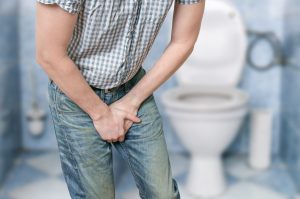
Probably not.
So, you might be asking yourself, “how do I know if I have a bladder infection?”
There are a few telltale signs that something is wrong with your bladder. There are also ways to minimize the risk of bladder trouble.
Your bladder is essentially a big balloon on your lower abdomen that holds urine. When it’s full, you feel the urge to go to the bathroom and urinate. Of course, that’s a perfect scenario. A bladder can become infected. They can also change with age.
The signs of bladder infection or other troubles include:
- Inability to hold urine/urine leaks (urinary incontinence)
- Needing to urinate 8+ times per day
- Having to awaken multiple times per night to urinate
- Sudden, urgent need to urinate
- Pain or burning before, during, or after urinating
- Cloudy or bloody urine
- Passing only a small amount of urine following a strong urge
- Trouble beginning urination or having a weak stream
- Trouble emptying bladder
These troubles could indicate a urinary tract infection. They may also indicate a weakening bladder.
Your bladder can get weaker with age and become more rigid, leaving less potential for expansion. Age can also lead to weaker bladder muscles that can influence bladder control.
That doesn’t necessarily mean that you are destined for bladder troubles. There are preventive measures for urinary incontinence and other issues that can affect bladder health and improve bladder strength. They include:
- Adequate intake of fluids. Fluid can help move urine through your bladder to limit the chance of infection.
- Limit caffeinated and alcoholic beverages.
- Increase intake of high-fiber foods. These foods reduce the risk of constipation, which can increase urges to urinate.
- Relax while urinating. Don’t push to relieve urine. Relaxing can help keep bladder muscles strong to prevent leaking.
- Wear cotton underwear
- Fully empty your bladder
- Only use the bathroom when needed
By identifying potential bladder troubles, you can alert your doctor earlier and come up with an effective treatment plan. Practice preventative measures to reduce the risk of issues.